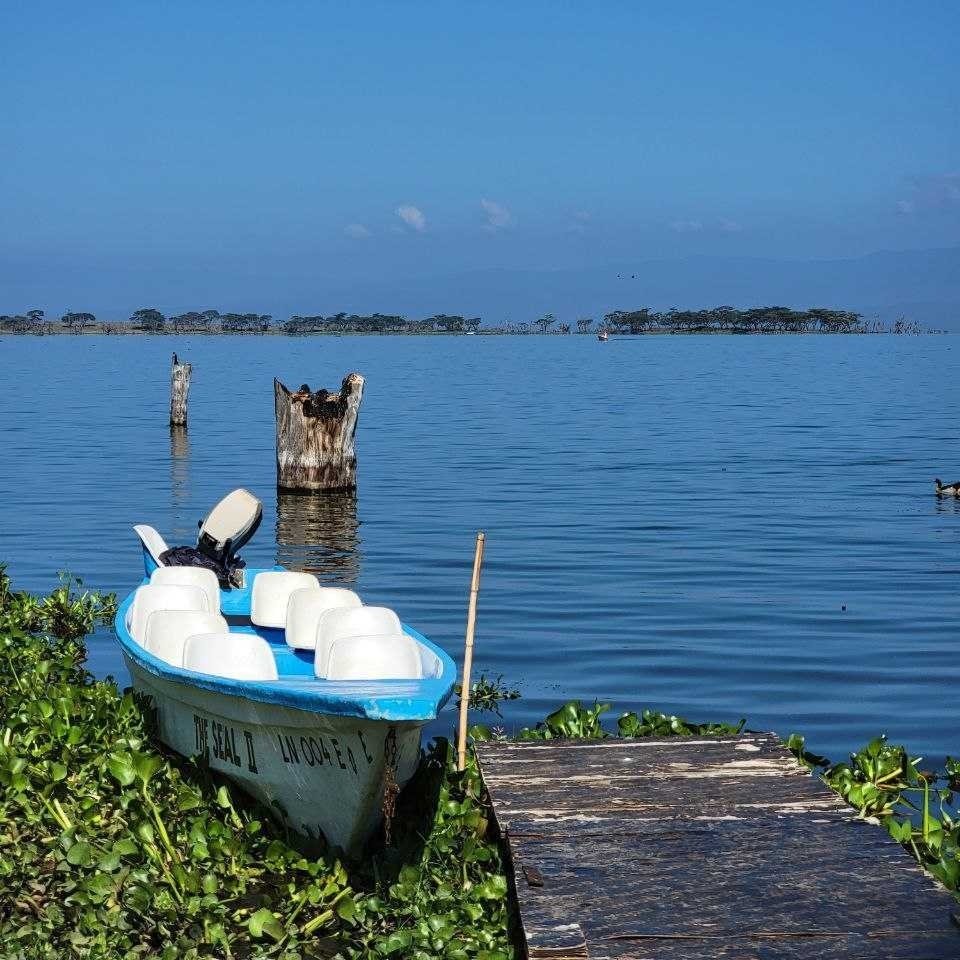Tobacco First
In February, ICA travelled to Kenya to attend the International Funders for Indigenous Peoples (IFIP) Global Conference, joining Indigenous leaders, funders, and allies from across the world. Ahead of the gathering, we spent time at Lake Naivasha, an ecologically rich but deeply impacted lake in the Great Rift Valley, where environmental and colonial legacies intersect in ways that mirror the struggles faced by Indigenous communities across Turtle Island.
When we arrived, we offered tobacco to the water–grounding ourselves in gratitude and respect. As visitors to this land, this offering was a way to acknowledge the spirit of the lake, the lands, and the people who have cared for them since time immemorial.
We set out on the water with Joseph, our boat guide, whose deep knowledge of the lake, its wildlife, and the changes it has endured guided our journey. As we glide across the surface, he points out the hippos bobbing near the shore, the fish eagles circling overhead, and the partially submerged trees and infrastructure—silent markers of how drastically the landscape has shifted.
In 2009, this same lake was nearly dry. A prolonged drought, driven by climate change, left its ecosystem on the brink of collapse. Now, the crisis has reversed. Since 2018, heavy rains and shifting weather patterns have caused the water levels to rise dramatically, flooding homes, displacing families, and submerging entire sections of the shoreline. Crescent Island, which was once a peninsula, became fully surrounded by water in 2020, transformed by the changing climate.
We learned that the flower industry took off in the 1980s, turning Kenya into one of Europe’s leading suppliers of fresh-cut flowers. Naivasha’s rich volcanic soil and abundant water make it an ideal location for large-scale flower farms, but this industry has also contributed to the lake’s ecological imbalance.
Decades of water extraction, deforestation, and unchecked development have disrupted the natural rhythms of the land. This crisis is not accidental—it is a direct result of colonialism and capitalism, systems that have long treated land and water as commodities to be exploited rather than as relatives to be cared for. What we see before us—the rising waters, the disappearing land, the disrupted lives—is the consequence of an economic model that prioritizes profit over the health of ecosystems and the survival of local communities.
As we step off the boat, we carry with us the stories Joseph has shared and the sight of the submerged trees–living reminders of a world out of balance. We are reminded that the climate crisis is not a distant threat. It is felt in our bodies, in our communities, and in the lands and waters that sustain us. It is global, yet deeply connected to the systems of extraction that have long targeted what Indigenous peoples have always honoured and protected as sacred.
The rising waters of Naivasha are more than just a warning—they are a call to action. As an Indigenous-led organization, we have always fought for the lands and waters, and we will continue to do so, ensuring that Indigenous leadership guides the way toward a future of balance and justice.
Join us in the fight
From World Water Day to Earth Day, we are fundraising to defend our waters—stand with us in solidarity to protect what is sacred.
Donate Today: Your contribution directly funds Indigenous-led climate justice initiatives. Every dollar is an act of solidarity – a commitment to protecting what is sacred.
Spread the Word: Share this campaign with your networks. Raise awareness about the urgent need to protect our waters.
Stay Engaged: Follow Indigenous-led organizations and activists. Support policies that protect water and Indigenous land rights.
From World Water Day to Earth Day, let’s do more than acknowledge the problem: let’s act. Together, we can ensure that resources flow where they are needed most, empowering Indigenous leadership and community-led solutions.
Shout out to all supporters! Every dollar you donate directly funds Indigenous-led initiatives, and Patagonia is matching donations for this campaign. The more we give, the closer we get to reaching our goal! Let’s do this!
Join us.
Take a stand.
Donate today.
When we protect the waters, we protect our future.







